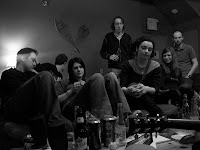When I got back from England last summer I faced a dilemma: get a job at a newspaper or seek employment in Canada. When I was in England someone gave me the brochure for
BUNAC, a work abroad program for college students and recent graduates, and I qualified for a Canadian open work visa that lasted six months. I opted to go to Canada because I wanted to continue working abroad (in England I had interned at a record label) and because it might have been my only chance to go to Canada; and I had wanted to visit that country for a long time. I decided to leave for Canada the following January. That way I would have enough time to plan things out; I didn't want to rush into it. But that left me with
alot of free time on my hands, which isn't a good thing in
Danville, Virginia because there isn't
alot of things to do here. So I decided to get a job to keep me busy until I left.
I found employment as a dishwasher at a popular
restaurant in
Danville. This was a complete turn around from the previous job I had. In England I spent my time doing online marketing for Fat Records, a
breakbeat* label located in south London. My days there were spent trying to make as many friends for them for their
Myspace web-site as I possibly could, and being saturated in
breakbeat music. My co-workers would play that stuff all day long. Everyday I'd sit at a computer, surfing the web looking for the homepages of people who loved
breakbeat music, while the
breakbeat played on in the background. Now I'd be in the back of a
restaurant cleaning the remnants of meals.
Washing dishes was exactly what I expected it to be too--disgusting. It is a monotonous job filled with nothing but cleaning slop and getting wet. At the restaurant we had a platform where all the dirty dishes would pile up, and this stood is stark contrast to the sleek, delicious-looking meals that were being served to the public. Back at the dish station you'd see all sorts of disgusting liquids oozing and dripping from plates. Looking at this was like looking at a squashed insect; all sorts of pieces of left over food would be left on those plates--as if somebody had destroyed something that was once living, and all that was left were misplaced organs and nasty liquids. The dishes
usually stank from the mixture of different liquids too, just like a
squashed insect.
After the dishes were put on the platform we had to knock off any left over food into one of two trashcans (one of which was under the platform). Those two trashcans would fill up with all sorts of disgusting stuff--half eaten chicken legs and steak, wet napkins, gravy, peas, ranch dressing, etc. After awhile a mound of slop would accumulate, and looking at this often made me think "What if you ate that stuff," which is what I didn't want to think but I couldn't help it. You would think that just looking at that stuff would be enough to make anyone not think about eating. But sometimes my co-workers would snatch pieces of food off the dishes--particularly food that looked like it hadn't been touched--and eat it while being surrounded by slop. I interpreted this as simply being apart of
dishwashing culture, although I wouldn't do it. Then we'd stack the plates on a tray, spray the plates off with a hose, send the tray with the plates through a huge washing machine and after the plates went through the machine we'd put the plates on a tray for the people up-front to bring up front. This is what I would do for hours on end for little appreciation and for little reward. Sometimes when I was stuck in this monotonous routine I'd think to myself "I will be so glad when I get to Canada."
*Breakbeat music is a sub-genre of techno







